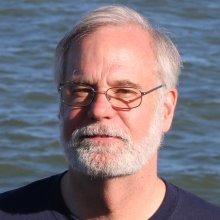
Kevin Roe
Tell us about your work/research. What kinds of things do you do?
I usually perform chemical analyses of hydrothermal vent fluids. My interest is in major and minor element inorganic analyses. I will be working with major samplers and mostly analyzing for sulfide, pH, and alkalinity and will bring back samples with me to shore to analyze for major and minor elements. This cruise will be different for me as it has been a few years since I did sediment pore water analysis and I have not worked on methane seeps before.
What sparked your initial interest in your career?
I grew up on an island off the mainland Washington coast and lived on beach property. I was interested in chemistry as a high school student but wanted to apply chemistry to something other than researching chemistry. Standing on the beach one day, it occurred to me that it would be interesting to understand the chemical reactions in the body of water I was staring at. I have been at it ever since.
Who influenced you or encouraged you the most?
My mother encouraged me to think about learning scientific methods as a help to my community. When I got to graduate school, my major professor and others allowed me to follow my own interests (within reason) and ended up getting involved in many projects.
What element of your work/study do you think is the most fascinating?
Much of what I do is to develop or apply analytical methods to get chemical data we couldn't get otherwise. So there is great joy in the problem-solving. Then there is the visual aspect. I have seen liquid carbon dioxide bubbling out of sediments 1500 meters deep. I have seen underwater volcanic eruptions and streams of molten sulfur. Every time I think I've seen it all, here comes another surprise.
What other jobs led you to your current career?
I declared a chemical oceanography major when I was 20 years old. Hydrothermal vents had not yet been discovered. After my masters, I was very much interested in hydrothermal fluid chemistry and was lucky enough to get employed in the field and also got to return to my home state.
What are your degrees and certifications?
Bachelor of Science-Chemical Oceanography, University of Washington 1979
Master of Science-Geochemical Oceanography, Florida State University 1983
What are your hobbies?
I enjoy working on houses. I have my boyhood home on Lopez Island, Washington that I have refurbished and it is getting time to do it again. I also put up a lot of firewood. There is something quite satisfying when you a good swing with a splitting maul and the round just blows apart.
What advice would you give someone who wants to have a career like yours?
I would advise getting a basic science degree first, such as chemistry, geology or biology. Once you enter an undergraduate or graduate program in Oceanography, get as much sea time as you can, early on, even if it is not exactly your project. Another suggestion that was made to me early on: Whatever task/analyses you will be doing at sea, practice it before going, so you can do it almost in your sleep--because most likely you will find yourself in that condition.
How did you get involved with the Nautilus Exploration Program? How did you get on the ship?
I was invited to help out by the Chief Scientist on this cruise. Our group has participated in this research before and the results allowed for greater participation.
Expeditions
Kevin participated in the following Ocean Exploration Trust expeditions:
